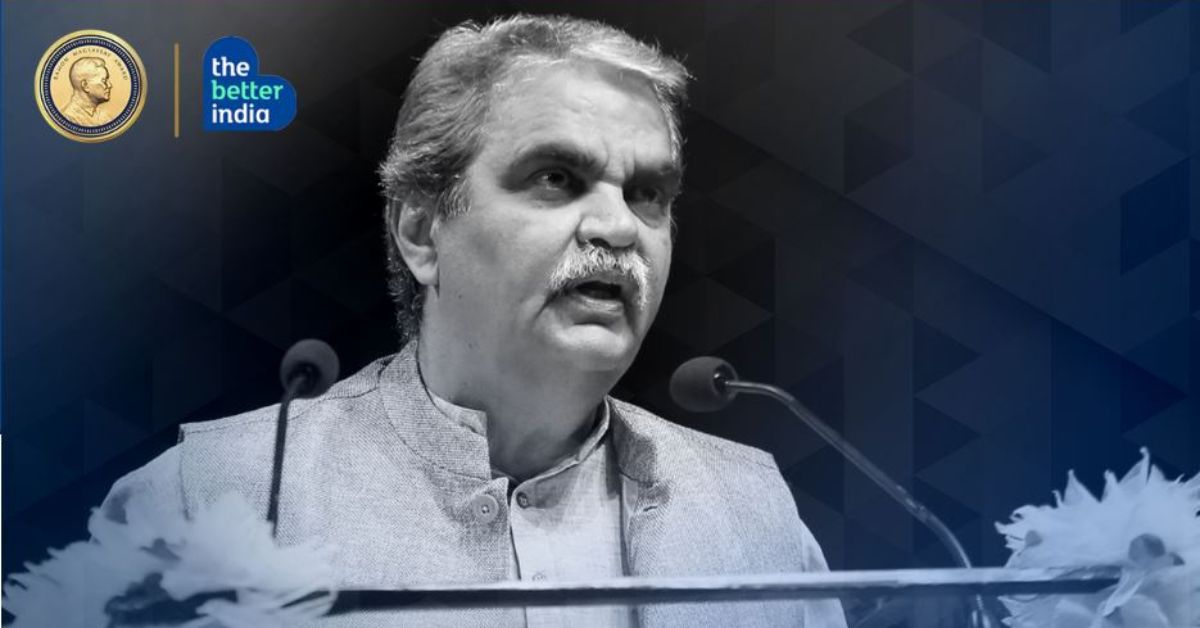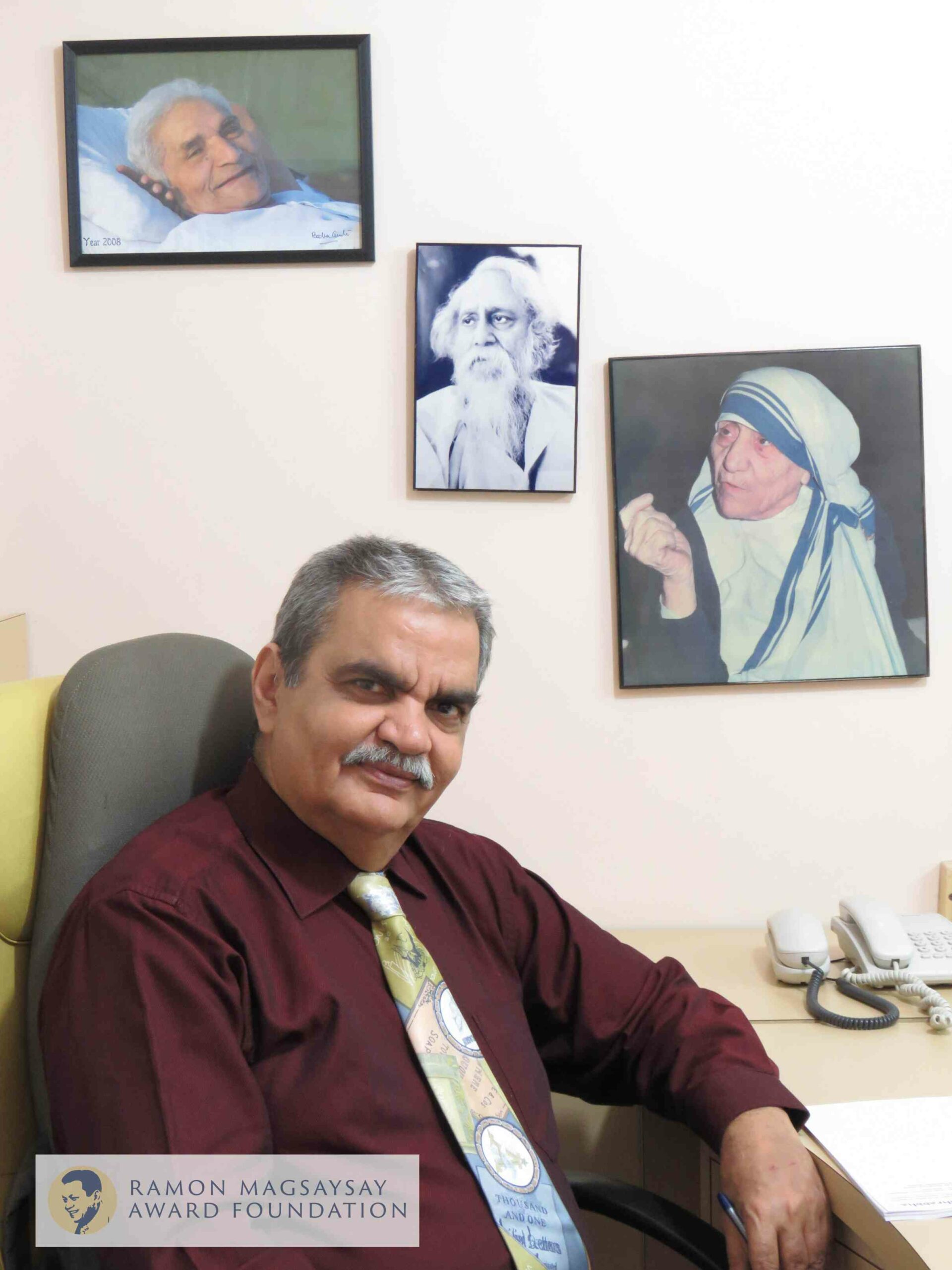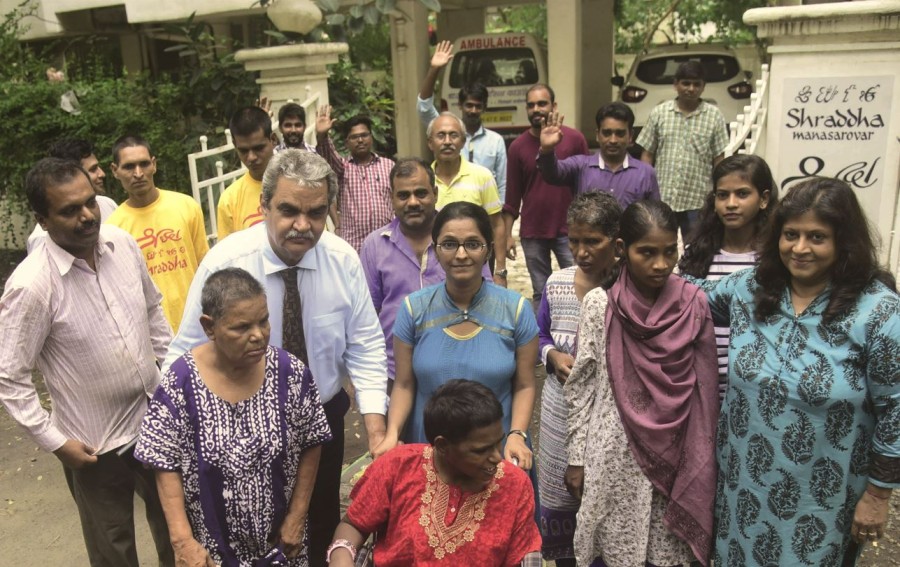Magsaysay Awardee Fought His Own Battles to Rescue 9000 Mentally-Ill Patients
Shraddha Rehabilitation Foundation was founded by Dr Bharat Vatwani and his wife, Dr Smitha to deal with the tragedies of the homeless, mentally ill, and more.

Dr Bharat Vatwani, an Indian psychiatrist, has been rescuing, rehabilitating and reuniting mentally-ill persons living on the streets with their families for over 30 years through his organisation Shraddha Rehabilitation Foundation. In 2018, Dr Vatwani received the Ramon Magsaysay Award, Asia’s premier prize and highest honour, for his tremendous courage and healing compassion in embracing India’s mentally-afflicted destitute, and his steadfast and magnanimous dedication to the work of restoring and affirming the human dignity of even the most ostracised in our midst.
Recently, we had a conversation with Dr Vatwani. Here are excerpts from the interview.

Have you struggled with mental health?
Dr Vatwani: This was put up on a huge board in the waiting room of my consulting chambers a good 22 years ago. It is still very much there.
“Some time ago, when I was going through a very depressive phase myself and was almost suicidal, I happened to seek solace from a friend of mine. During the course of our conversation, I was spontaneously asked by him whether I had ever, ever, ever had a dream. I could not answer him then, because being depressed, I did not know whether there was anything worth living for, worth caring for, worth dreaming about. But over the years, my thoughts have crystallized and the gloom of depression has given way to a dream”.
The idea behind sharing these writings was to make the patients seeking me out believe that I was one of them and had been through psychiatric issues myself and overcome them.
How did your patients react to you sharing your experiences?
Dr Vatwani: My attempt at breaking the stigma surrounding mental illness did not work out as well as I would have wanted. At times, the patients left the waiting room thinking that if the psychiatrist whom they were about to consult had gone through illness himself, how could he be trusted to treat another person? How could they place their well-being in my hands?
While this attitude towards ‘stigma’ associated with mental illness has diminished over the years, I believe that India and perhaps the entire world still have a long way to go. The mentally ill, the world over, are invariably shunned, rejected, neglected and a denied lot.
Does mental illness carry a stigma?
Dr Vatwani: Mental illness does carry a stigma, which could be:
- the prejudices/discriminating behaviour by society towards people
(and their relatives) labelled with psychiatric illness (social stigma) - the internalising by the patient of their perceptions of discrimination (self-stigma)
What are the fallouts of stigma?
Dr Vatwani: Exclusion, low self-esteem, poor social support. Stigma causes mentally-ill people to feel ashamed for something that is in reality, out of their control. There is social isolation and social loneliness.
Worst of all, stigma prevents the mentally ill from seeking the help they need.
Stigma has a detrimental effect on treatment outcomes. Stigma remains the cornerstone of stumbling blocks in the addressing of mental illness.
Can stigma be overcome in the long run?
Dr Vatwani: Deeply entrenched issues in society like racial discrimination, caste discrimination, and gender inequality are invariably slow-burn issues involving decades, if not centuries for them to be addressed. The stigma associated with mental illness falls in the same category.
While one may believe that one has contributed, more often than not, the contribution becomes miniscule, given the gigantic overwhelming gestalt of the problem. But one has to persevere and persist.
In the final analysis, the acknowledgement of mental illness by the patients and their caregivers to their own selves and significant others within their communities becomes the cornerstone of a better prognostic outcome.
This becomes all the more significant when one looks at the graveness of the prevalence of mental illness worldwide, reflected by WHO estimates which claimed that by 2030, Depression would be the leading global disease burden.
The key to the acknowledgement of mental illness is empathy and compassion.

Could you elaborate on the work you are doing?
Dr Vatwani: Shraddha rescues wandering mentally ill destitute, brings them to their institute and provides them care, food, shelter and appropriate psychiatric treatment. Once psychiatric wellbeing is achieved (often taking 2-3 months), these destitute are helped in tracing out their antecedents, from wherein the reunion with the original family and native home takes place in the farthest corners of India and nearby countries.
All these services, from the moment they are rescued from the streets till the time they are reunited with their families in their native village, are rendered absolutely free of cost.
When did you start and why?
Dr Vatwani: This journey took off one fine day in 1988, while sitting in a restaurant. My wife and I noticed a young boy who was horribly skinny, dirty, disheveled and in a bad shape, sitting just across the road. Being psychiatrists ourselves, we could make out that he was a schizophrenic.
We brought him to our newly set up private nursing home.
The nursing home setting up had involved us selling all the jewellery which my wife had received as gifts in our marriage and taking loans from various banks with property hypothecation et al. This unknown schizophrenic was the first indoor admission to our nursing home.
We nursed him, treated him with appropriate psychiatric medicines and gradually he improved. In two weeks, to our utter astonishment, he started speaking in English. It turned out that he was a Bachelor of Science (BSc) graduate, had even finished his Diploma in Medical Laboratory Technology (DMLT) and had come to Mumbai to hunt for a job, and upon not getting one, had succumbed to mental illness and ended up on the roads.
We wrote to his father who came down by flight from Hyderabad as he was desperately hunting for his son for almost a year. It turned out that he was the Superintendent of a Zilla Parishad in the Cuddapah District of the state of Andhra Pradesh.
Mental illness could affect the best of the best and reduce a person to pathetically inhuman conditions. And suddenly we realised that there was no organisation dealing with such people.
What inspired you?
Dr Vatwani: The unfortunate men and women whom you often see wandering on the roads, lost in their own world, laughing and talking to themselves, with dirty long matted hair, half naked, and skin and bones appearance. They could be just barely surviving on garbage, gutter water and whatever leftovers of food are thrown at them by passers-by. They were invariably in much worse shape than the poorest of the poor because they had no one, absolutely no one to look after them. They could be on the roads for days/weeks/months/years/decades without clothing, shelter or food. No one would give them a second glance and often no one would care whether they lived or died. They were stripped of all human dignity, but we realised that they were humans nevertheless.
Shraddha Rehabilitation Foundation was founded to deal with the above tragedy of the homeless mentally ill destitute wandering aimlessly on the streets of India.
And we decided to do whatever bit we can for the cause of this last man standing on the streets – vis-à-vis the wandering mentally ill destitute.
Today Shraddha stands strong proving itself to be a time-tested and a very hopeful humane experiment in itself, providing treatment, protective care and rehabilitation to a neglected group of wandering mentally ill roadside destitute and reuniting them with their lost families (loved ones) and correspondingly spreading awareness in the farthest corners of India during and en route reunions.
This model has spearheaded more than 9,000 reunions and seems to be capable of replication at a national level vide shelters run by government and NGOs, addressing the very much existent issue of mammoth quantum of homeless destitute roaming around aimlessly on the streets pan India and other neighbouring countries as well.
And all these day-to-day life transformations at Shraddha, founded on innate compassion, translated into heartfelt efforts. Numerous reunion stories — etched with emotions, immersed in appreciation and blessings from the families of these souls, and others who have somehow witnessed or had a glimpse of these transformations — have provided us with the impetus to continue on our chosen path.
The Ramon Magsaysay Award Foundation (RMAF) is an international wholly independent non-profit organisation based in Manila, Philippines. RMAF manages the Ramon Magsaysay Award, Asia’s premier prize and highest honour. Follow them on Facebook and LinkedIn.
Written by Magsaysay Award Foundation; Edited by Yoshita Rao
If you found our stories insightful, informative, or even just enjoyable, we invite you to consider making a voluntary payment to support the work we do at The Better India. Your contribution helps us continue producing quality content that educates, inspires, and drives positive change. Choose one of the payment options below for your contribution- By paying for the stories you value, you directly contribute to sustaining our efforts focused on making a difference in the world. Together, let’s ensure that impactful stories continue to be told and shared, enriching lives and communities alike. Thank you for your support. Here are some frequently asked questions you might find helpful to know why you are contributing?

This story made me
-
97
-
121
-
89
-
167

















